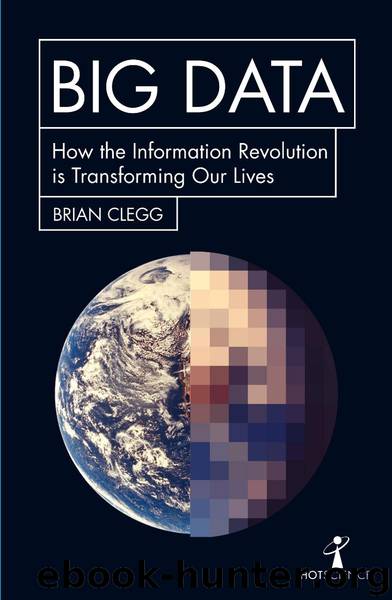Big Data by Brian Clegg

Author:Brian Clegg [Brian Clegg]
Language: eng
Format: epub, mobi
ISBN: 9781785782497
Publisher: Icon Books Ltd
Published: 2017-04-09T04:00:00+00:00
Social media and social evolution
It’s rare for anyone, hermits apart, to live in isolation. We have always had social networks. Friends, relations, work colleagues, acquaintances we nod to, people we see regularly when commuting and wish that we could work up the courage to say ‘Hello’ to. However, big data has taken this concept to a different level, and the impact of the change that social media is having was never predicted or thought through.
At the time of writing, Donald Trump has recently been elected as US president, and much is being made of the ‘false news sites’ that pumped out fictional negative ‘news’ stories via social media. Of course, there have always been attempts to use propaganda for political ends, particularly where the state controls the media. But in the free world, the press has offered a filtering service that, at its best, managed to fact check and weed out outright lies. Social media, however, has no such filtering. What’s more, we tend to put more weight on things that we are told by people in our social networks than we do from a remote source – and this weighting seems to have crept through to big data social networks too.
Part of the problem with this kind of false information is that it is far easier for information to spread on social media than in the physical world. If you receive a shocking bit of news on Facebook, it only takes a couple of clicks to pass it on to your personal network. It’s not an unrealistic metaphor that this kind of information spreading is described as viral – it has the same kind of one-to-many spreading mechanism that fuels an epidemic.
As yet, our individual behaviour hasn’t caught up with Facebook, Twitter and the other platforms. Most of us don’t have the skills to perform a quick fact check before spreading a piece of news. And similarly, we aren’t particularly well equipped to deal with the additional scale of social networking that these systems provide. Our natural networks tend to involve small numbers of close contacts – say six to ten – with another layer of ‘friends of friends’ taking them up to a maximum of around 100. But most heavy users of Facebook, for example, will have many hundreds of ‘friends’.
How can we possibly cope with the output of such vast networks? We can’t. Facebook makes sure of this because the weighting on what we see is left to Facebook’s totally opaque algorithms, which decide how frequently and prominently we see input from each ‘friend’. Some kind of sifting is certainly necessary – but the problem is that we have no idea how those algorithms work or control over them. I suspect that at the moment Facebook is ethical and unbiased. But let’s imagine that in the future the company was bought by a malignant power. And they decided they wanted to bias an election in your country. The power is in their hands, because we have no idea how they are selecting what appears on our social media feeds.
Download
This site does not store any files on its server. We only index and link to content provided by other sites. Please contact the content providers to delete copyright contents if any and email us, we'll remove relevant links or contents immediately.
Algorithms of the Intelligent Web by Haralambos Marmanis;Dmitry Babenko(18333)
Azure Data and AI Architect Handbook by Olivier Mertens & Breght Van Baelen(7693)
Building Statistical Models in Python by Huy Hoang Nguyen & Paul N Adams & Stuart J Miller(7683)
Serverless Machine Learning with Amazon Redshift ML by Debu Panda & Phil Bates & Bhanu Pittampally & Sumeet Joshi(7550)
Driving Data Quality with Data Contracts by Andrew Jones(7325)
Data Wrangling on AWS by Navnit Shukla | Sankar M | Sam Palani(7314)
Machine Learning Model Serving Patterns and Best Practices by Md Johirul Islam(7043)
Learning SQL by Alan Beaulieu(6288)
Weapons of Math Destruction by Cathy O'Neil(6279)
Big Data Analysis with Python by Ivan Marin(5970)
Data Engineering with dbt by Roberto Zagni(4950)
Solidity Programming Essentials by Ritesh Modi(4589)
Time Series Analysis with Python Cookbook by Tarek A. Atwan(4419)
Pandas Cookbook by Theodore Petrou(4105)
Blockchain Basics by Daniel Drescher(3581)
Natural Language Processing with Java Cookbook by Richard M. Reese(3169)
Hands-On Machine Learning for Algorithmic Trading by Stefan Jansen(3071)
Learn T-SQL Querying by Pam Lahoud & Pedro Lopes(2961)
Feature Store for Machine Learning by Jayanth Kumar M J(2940)
